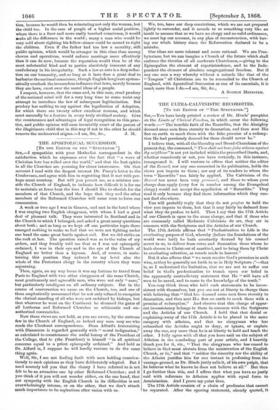THE APOSTOLICAL SUCCESSION.
[To THE EDITOR OF TIIE "SPECTATOR."] SIU,—I sympathize with your Methodist correspondent in the satisfaction which he expresses over the fact that "a wave of Christian love has rolled over the world," and that the best spirits in all the Churches are yearning for closer intercourse. On that account I read with the deepest interest Dr. Pusey's letter to the Conference, and agree with him in regretting that it met with per- haps scant courtesy. But will you permit me, as a minister out- side the Church of England, to indicate how difficult it is for me to maintain at fever heat the love I should like to cherish for the members of that Church, and the hope that they and the other members of the Reformed Churches will come soon to form one communion.
A week or two ago I was in Geneva, and met in the hotel where I was staying two English clergymen, with whom I had a good deal of pleasant talk. They were interested in Scotland and in the Church to which I belonged, and asked a great many questions about both ; and as long as we kept off one particular topic there emerged nothing to make us feel that we were not fighting under one head the same great battle against evil. But we did strike on the rock at last. The question raised was as to the value of my orders, and they frankly told me that as I was not episcopally ordained, I was in their eye and in the eye of the Church of England no better than a layman. And, of course, in main- taining this position they reduced to my level also the whole of the Protestant clergy in the country where they were sojourning.
Then, again, on my way home it was my fortune to travel from Paris to England with two other clergymen of the same Church, most gentlemanly and agreeable men, who were not only "sane," but particularly intelligent on all ordinary subjects. But in the course of conversation we came on the Church, too, and one of them emphatically announced that he not only refused to recognize the clerical standing of all who were not ordained by bishops, bat that wherever he went on the Continent he shunned the gates of all Lutheran and Reformed Churches as schismatic and un- authorized conventicles.
Now these views are not held, as you are aware, by the extreme few in the Church of England, as indeed any man may see who reads the Cheshunt correspondence. Dean Alford's fraternizing with Dissenters is regarded generally with "moral indignation," as calculated to countenance the awful heresy of the President of the College, that he (the President) is himself "in all spiritual concerns equal to a priest episcopally ordained." And bold as Dr. Alford is, I suppose he will hardly venture to do the same thing again.
Well, Sir, I am not finding fault with men holding conscien- tiously to such opinions as they have deliberately adopted. But 1 need scarcely tell you that the theory I have referred to is not felt to be an attractive one by other Reformed Churches ; and if you think of it you will not wonder either, on the one hand, that our sympathy with the English Church in its difficulties is not overwhelmingly intense, or on the other, that we don't attach much importance to its aspirations after union with us. We, too, have our deep convictions, which we are not prepared lightly to surrender, and it sounds to us something very like an insult to assume that as we have no clergy and no valid ordinances, we must lay our account, in any plan of reconstruction, with hav- ing our whole history since the Reformation declared to be a mistake.
Our ideas are more tolerant and more rational. We are Pres- byterians, but we can imagine a Church of the future which shall embrace the theories of all moderate Churchmen,—giving to the Episcopalian the element of superintendence, and to the Inde- pendent the element of absolute congregational freedom. But if any one sees a way whereby without a miracle like that of the " Tongues " all Christians are to be reconciled to the Church of England, with Apostolical Succession as one of its essentials, it is much more than I do.—I am, Sir, &c.,
A SCOTCH MINISTER.






























 Previous page
Previous page